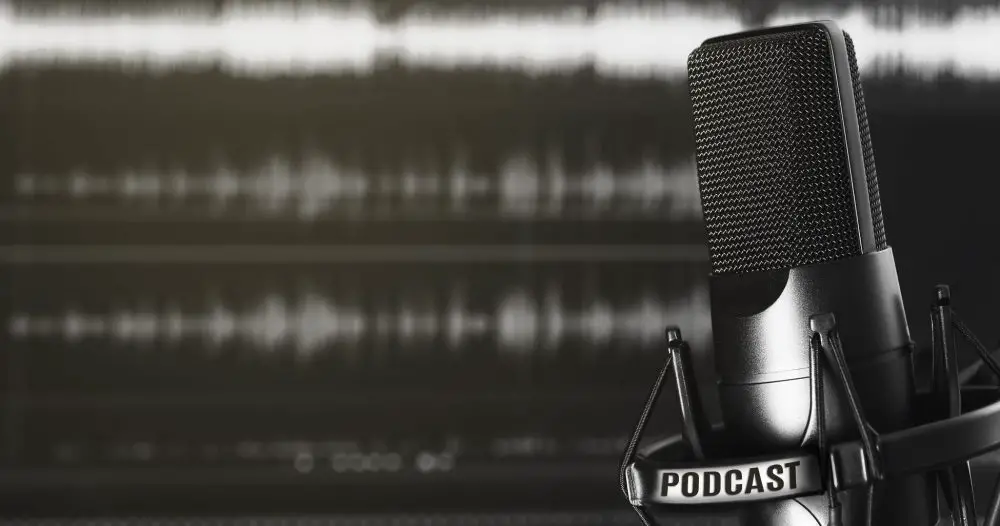There’s no doubt that podcasts have skyrocketed in popularity in the last few years.
In the US, 50% of homes now class themselves as “podcast fans” — that’s over 60 million homes in total.

The latest stats from January 2021 show that there are currently over 1,750,000 podcasts out there, including over 43 million episodes on Apple Podcasts.
So, is the industry oversaturated? Let’s discuss…
Table of Contents
A closer look at the figures
For a market to be oversaturated, there needs to be a lack of demand for podcasts?
Well, figures suggest otherwise; if anything, more and more people are catching on with the podcast trend – which means there’s an increasing demand for content.
For example, in the US alone, over 104 million people have tuned into a podcast in the last month – that’s way more than the number of podcasts and even the amount of episodes available.
And think about it. These people are all tuning into different podcasts on different topics. And there are always more topics out there to explore.
Especially in today’s world, we live in a cycle of 24-hour news and short expiry dates.
The demand for something new is always there.
Podcasting is about individuality.
While it’s likely that a podcast has been done on the same topic as the one you’re thinking of discussing, there’s no reason why you can’t discuss it from a different standpoint.
That’s the beauty of podcasts: while writing does allow you to have some kind of “voice,” it’s a lot easier for this to come through in a podcast rather than a piece of writing.
People listen to podcasts not necessarily for the topic but for the host, too. It might be that they’re funny, have an interesting way of viewing things, or a good way of explaining something – every podcaster can offer something different – even if the topic isn’t new.
This is why it’s important to identify your niche – what will make your podcast stand out from others?
Quality time with your audience
In pretty much every other entertainment and news aspect, the audience’s attention span is pretty short. Marketers recommend 60-second videos for Instagram and 2-minute ones for Youtube. Whereas in contrast, 80% of listeners will listen to an entire podcast episode, or at least the majority of it.
This is another reason why you shouldn’t dismiss podcasts as being oversaturated.
If you’re a brand or a business, a podcast could provide you with quality attention from your audience. This could help you establish better connections with them and make them more likely to engage with you.
Similarly, journalists may opt to use podcasts to unpack in-depth stories in more detail than they are afforded in the fast-paced news industry.
And, while we can get this from documentaries, too, documentaries are less convenient for your commute to work, and you can’t watch them and run like you can with a podcast.
This is another factor that makes podcasts stand out. They offer space for in-depth exploration of a topic, and they capture the listener’s attention in a way no other modern medium can.
Amplify other voices
While podcasts are a great way to amplify your brand’s voice and showcase your opinions and personality, they’re also a great opportunity to scout out interesting voices to feature in your episodes.
These may be well-known individuals, in which case it can be great for boosting downloads, but they also might be unknown voices or those that haven’t had much of a platform before.
In this case, podcasts are the perfect way to unveil new talent to the world. They also offer that level of depth that social media and copy don’t allow for.
Room for new topics
The most popular podcast genres in the US in 2020 were Comedy (22% of weekly listeners), News (21%), and True Crime (18%).
This not only signals that there’s a huge appetite for these subject areas but also begs the question of what genres haven’t been covered or perhaps haven’t been done well.
Like we said before, it’s all about finding a niche. That niche may be within a popular genre that’s well-covered, or it may be a niche within a niche. Still, the main thing is to identify what will draw people to your podcast and what sets it apart from the hundreds of other comedy shows or news podcasts.
Do it because you love it.

If you want to create a podcast, you should be motivated intrinsically as well as extrinsically.
Sure, there may be monetary value in creating a popular podcast, but regardless of how many downloads you get, you should create a podcast because you love podcasting and have a passion for the subject you’re talking about.
Not only this but as we said earlier, podcasting is a great opportunity to really get your listener’s attention and delve deep into a topic. With this in mind, it’s about quality more than quantity.
We mean this in two ways.
Firstly, quality of the podcast, and providing episodes that are produced to a high standard and are rich in content; and secondly, appreciating that even if your podcast doesn’t yield thousands of downloads, even attracting the attention of a few hundred listeners is pretty impressive in a world as fast-paced as today.
Podcasting is an art form, and we wouldn’t say the literary or art world is oversaturated because each book, poem, or painting offers something different, right?
So why should podcasting differ?
Frequently Asked Questions
What are three reasons podcasts are so popular?
- They’re easily accessible.
Just like Netflix or Amazon Prime, podcasts are available on-demand whenever you need them. Whether it’s early in the morning on your daily commute or jog, or when you’re unwinding late at night.
No matter where you are, so long as you have your phone, podcasts are available at your fingertips, and they can even be downloaded so you can enjoy them offline.
- Podcasts allow you to multitask
Unlike print or video, podcasts don’t need 100% of your attention. You can’t read a book while you run or watch a video while you drive, but you can listen to podcasts doing these things.
While we all love listening to music, podcasts can sometimes offer the comfort of another voice but provide education and stimulation, too. Many people view podcasts as a form of entertainment, but whatever the subject, they’re a source of knowledge, too.
- Podcasts are free
Podcasts are available on a variety of apps, and for the most part, they’re free.
This makes them widely accessible and a great way of furthering your knowledge without purchasing books or streaming services.
Why is everyone making podcasts?
The answer to this is pretty similar to the previous answer. Individuals and companies are making podcasts because:
- They’re convenient and fit into people’s lives. You don’t need to come to a complete stop to listen to a podcast; you can enjoy it while on the go.
- They grab the audience’s attention for longer. Like we said earlier, the modern human has a notoriously short attention span; however, for some reason, they can tolerate the podcast, and this form is perfect for exploring topics in-depth while capturing the attention of your audience.
- Less competition. Sure, there are many podcasts out there, but nowhere near as many as there are blogs (19 million active blogs / 1 billion YouTube users).
- Podcasts are more intimate. They allow you to get closer to your audience, not only because the form allows you to inject more personality and voice into your content but also because the nature in which podcasts are recorded and edited allows the listener to feel like they’re in the room with you.
Is podcasting dying?
No, podcasting is not dying! Statistics suggest quite the contrary.
In the US, 51% of people aged 12+ have listened to a podcast, with 32% listening monthly and 22% weekly.
Not only this, but data from 2019 suggests people are listening to podcasts more than before, with 41% of monthly listeners listening to more podcasts in 2019 compared to 2018, and just 13% saying they are listening to less.
The term ‘podcast’ has also become more widely known.
It’s estimated that 197 million people or 70% in the US aged 12+ are familiar with podcasting, indicating that people who are aware now but weren’t before may start listening to podcasts soon.
It also seems that the younger generations enjoy podcasts the most, and, with smartphones playing an increasingly prominent role in our lives, surely podcasts will only become more popular.
Why do most podcasts fail?
There are several reasons why some good (and some bad) podcasts fail to generate downloads:
- The main reason is a lack of unique positioning. This links back to what we said about finding your niche. Before recording a podcast series, you need to do plenty of research by listening to other podcasts on this subject area. This is the best way to learn and identify the holes you can fill with your episodes.
- Another reason is a lack of authentic voice. After all, allowing your personality to come through in a recording is a lot harder than many people anticipate. It takes time to find this, and some people give up before they find their feet.|
- Finally – inconsistency. When you announce the date your new episode will be released, you need to stick to this. If your episode isn’t available when promised, a listener will move onto another show, and it’ll be pretty difficult to win them back after this.
